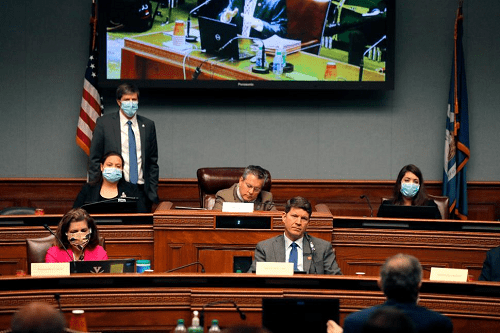
THE ASSOCIATED PRESS
The Louisiana Legislature’s return to session during the coronavirus pandemic came with irritation over masks, disagreements over what bills are essential and less public engagement in the lawmaking.
By Associated Press, Wire Service ContentMay 10, 2020, at 4:00 p.m.
BATON ROUGE, La. (AP) — The Louisiana Legislature’s return to session during the coronavirus pandemic came with irritation over masks, disagreements over what bills are essential and less public engagement in the lawmaking.
Significant changes to law are moving quickly, with legislators trying to cram bill passages that would have stretched over months into the remaining four weeks of session. Bills are advancing even as lawmakers expressed concern about their implications, with sponsors promising to “clean it up” and tighten language later.
The fast-tracked process comes as some Democratic lawmakers refuse to attend the session because of the coronavirus outbreak — and with noticeable absences from advocacy groups, lobbyists and the general public who regularly packed hearing rooms in the days before Louisiana became one of the nation’s virus hot spots.
As more people try to watch the legislative process from afar, livestreams of hearings have failed, bill amendments haven’t always shown up online and the Legislature hasn’t created a way for people to testify remotely. Written testimony is filed in the legislative record and circulated to lawmakers, but not regularly read aloud or provided for non-legislators to read.
Senate President Page Cortez said he thought the legislative session’s return is “going great. I have not had any negative feedback from any senators or from any of the stakeholders.”
The Lafayette Republican said he doesn’t see the approach as limiting access, though he acknowledged some people may not be attending hearings in person because they’re not “moving out and about even if they can.” He said those who don’t want to go to the Capitol could send an email or call lawmakers to discuss bills.
The first week of legislative action included discussions of the virus’s impact on the economy, state budget, education and health services. It also included debates over whether to ban handheld cellphone use by drivers; whether to remove the mandatory age limit for constables and justices of the peace; and whether to adopt daylight savings time year-round if Congress allows such a change.
A Senate committee spent hours Thursday night debating a proposal sought by the oil industry to nullify parish lawsuits against oil companies for damage to coastal wetlands. Supporters argued the timing was critical because the oil industry is struggling with the impact of the virus and a steep drop in oil prices.
The lawsuits are “going to put a nail in the coffin of an industry that I believe is vital,” said Sen. Sharon Hewitt, a Slidell Republican, before a 4-3 vote sent the bill to the Senate floor.
Opponents said the oil industry was trying to seize an opportunity in a chaotic time. Parish officials in opposition said they were stunned to leave virus emergency response efforts for such a debate.
“This here tonight is ridiculous,” said St. Bernard Parish President Guy McInnis. “We’re having a worldwide pandemic, and we’re here having a fight.”
Lawmakers pushing measures criticized as unrelated to the virus suggest they have time to fit these types of discussions into the session because not every committee is preoccupied with the budget or virus-related bills.
“Every bill creates more meeting time, more occupants at the Capitol and more human interactions. Committee chairs should ask: Is this bill worth the risk of making someone sick? Why can’t it wait?” wrote the nonpartisan Public Affairs Research Council in a report recommending how to handle business safely and with public input.
Cortez and House Speaker Clay Schexnayder have staggered committee hearings to lessen building traffic. Cleaning measures have increased, with tables wiped down and seats sprayed between speakers to committees. Plexiglass partitions were installed in the House chamber between seats. Temperatures are taken to enter the building. The House and Senate are offering lawmakers, staff and the public masks and gloves.
But while masks are “encouraged,” no one is required to wear one in the Louisiana Capitol — even as Gov. John Bel Edwards repeatedly calls on residents to do so when encountering people outside of their households. Democratic lawmakers are wearing masks, while Republicans are mixed in whether they use a face covering.
Even those wearing masks aren’t necessarily following the public health guidance on how to use them. And people without masks are talking closely in small groups, though that puts people at greater risk of contracting and spreading the virus.
___
EDITOR’S NOTE: Melinda Deslatte has covered Louisiana politics for The Associated Press since 2000. Follow her at http://twitter.com/melindadeslatte
